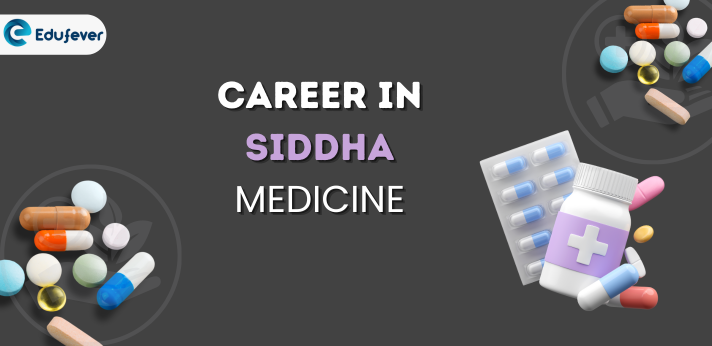Career in Siddha Medicine in India: Siddha medicine is a traditional Indian medical system. Experts in this field are called Siddhars or Siddha doctors. They use methods from texts written in Tamil, making it popular in Tamil-speaking parts of India. This article covers careers in Siddha medicine in India and the types of jobs available after completing a Siddha medicine course.
Siddha education became formalized in the mid-20th century to serve public needs. Academic and scientific research has progressed since then. The government is working to gather, review, and organize existing manuscripts.
Do you want to become a Siddha specialist but aren’t sure how to start? This article can answer your questions and guide you.
[Page Index]
Quick Facts
The following is a brief for the Career in Siddha Medicine course:
| Particulars | Description |
|---|---|
| Course Name | UG: BSMS PG: MD |
| Course Duration | UG: 5.6 Years PG: 3 Years |
| Eligibility | UG: 10+2 PG: BSMS degree |
| Admission Process | UG: NEET PG: AIAPGET |
| Average Course Fee | INR 17,875 |
| Average Starting Salary | 2.3 lakhs p.a |
| Career Options | Pathologist, Dermatologist, Physiologist, Lecturer, Medical Botanist |
| Employment Sector | Own clinic, public hospital, research field, a medical professor |
What is Siddha Medicine?
Siddha Medicine is a traditional Indian treatment system that originated in South India and focused on eight supernatural powers. The Siddhars believe that a good soul lives only in a healthy body, and this concept made them feel the importance of Siddha medicine. Siddha medicine is better suited for all forms of diseases except emergencies.
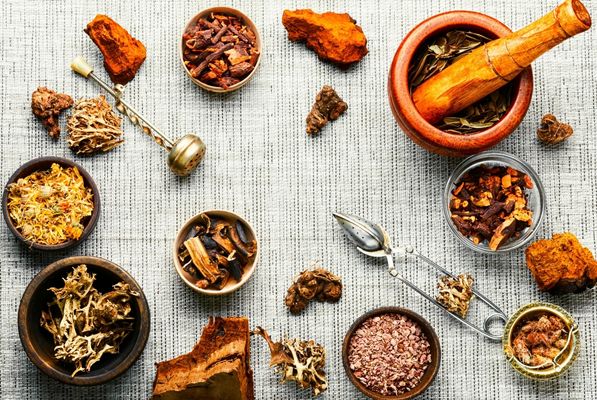
All diseases range from diseases concerning the skin (especially Psoriasis) to sexual disorders, urinary infections, or even common diseases such as fever, cold, headache, allergies, etc. Siddhars start the treatment stage only after the root causes of the disease are confirmed, and this is done by testing heartbeats, skin colour, eyes, sound, tongue, and digestion process. Siddha Medicine Course is more concerned with the patient’s age, background, sex, habits and health conditions rather than the disease.
Who are Siddha Doctors?
Siddha doctors provide personalized treatment considering the patient’s physical, mental, and emotional health, as well as their living environment and diet. While the job is similar to other doctors, the treatment methods and medications may differ.
Siddha doctors also manage the Siddha clinic, make sure medicines are prepared correctly, and ensure patients take their medication as prescribed.

Career in Siddha Medicine Courses in India
To work as a Siddha medicine Specialist or to make a career in Siddha medicine, one can earn a degree by following a Siddha medicine course.
Undergraduate Courses
| Course Name | Duration |
|---|---|
| Bachelor of Siddha Medicine and Surgery (BSMS) | 5 .6 Years |
Post-graduate Courses
| Course Name | Duration |
|---|---|
| M.D. (Siddha) Varma Maruthuvam (Varma Medicine) | 3 years |
| M.D. (Siddha) Pura Maruthuvam (External Therapy) | 3 years |
| M.D.(Siddha) Nanju Maruthuvam (Toxicology) | 3 years |
| M.D. (Siddha) Noi Naadal (Pathology and Diagnostic Methods) | 3 years |
| M.D. (Siddha) Pothu Naruthuvam (General Medicines) | 3 years |
| M.D. (Siddha) Gunapadam (Pharmalogy) | 3 years |
| M.D. (Siddha) Kuzhanthai Maruthuvam (Paediatrics) | 3 years |
| M.D. (Siddha) Siddhar Yoga Maruthuvam (Yoga Science) | 3 years |
| M.D. (Siddha) Siddha Maruthuvam Adipaadai Ariviyal (Fundamental Principles of Siddha Medicine) | 3 years |
| M.D.(Siddha) Aruvai Maruthuvam (Siddha Surgical Procedures) | 3 years |
| M.D.(Siddha) Sool and Magalir (Obstetrics and Gynaecology) | 3 years |
| M.D.(Siddha) Thol Maruthuvam (Dermatology) | 3 years |
How to get admission to the Siddha Medicine Course?
- Aspiring candidates should have passed from 10+2 with a minimum of 50% aggregate marks in the science stream (PCB) to be eligible for the Siddha medicine course.
- For undergraduate courses, an NEET scorecard is required for admission, and you must participate in Tamil Nadu Ayush NEET counselling.
- AIAPGET is required for admission to postgraduate courses, and counselling can be done through Tamil Nadu AIAPGET.
Eligibility Criteria
A candidate must be qualified for the eligibility criteria. Various qualifying requirements must be satisfied to participate in the courses offered by different colleges and institutions.
The following are the primary requirements for admission to the Undergraduate courses:
| Particulars | Description |
|---|---|
| Age limit | Minimum 17 years of age on December 31 of the application year. |
Qualification | Candidates must have passed 10+2 or equivalent examination with Physics, Chemistry, Biology/Biotechnology and English as the core subjects. Candidates must have passed Class 10th with Urdu or Arabic or Persian language as a subject or must have passed the test of Urdu of Class 10th. |
Qualifying Exam Marks | All General category candidates must have at least 50% marks in 10+2 or equivalent examination. Reserved category candidates must have at least 40% marks. |
| Qualifying Entrance Exam | According to the Ministry of AYUSH, completing the entrance exam is also necessary to qualify for a B.S.M.S. Candidates must have a Qualified NEET exam. |
The following are the primary requirements for admission to the Postgraduate courses:
| Particulars | Description |
|---|---|
| Qualification | Candidates with qualified Bachelor of Siddha Medicine and Sciences (BSMS) are ready to take admission for MD in Siddha Medicine. |
| Qualifying Entrance Exam | AIAPGET |
Syllabus for Siddha Course in India
The following is the syllabus for the Siddha course:
| Semester I | Semester II | Semester III |
|---|---|---|
| Biochemistry | Pharmacology I | Varmam Therapy |
| Siddha Medicine- Principles and History | Siddha Pathology | Toxicology and Forensics |
| Physiology I | Microbiology | Paediatrics |
| Communicative English | Pharmacology II | Gynaecology and Obstetrics |
| Physiology II | Animal and Plant Kingdom Analysis | Dental Disease and Bone Setting Surgery |
| Pharmacognosy | Modern Pathology Principles | Special Medicine and External Therapy |
| Anatomy I | Pharmaceuticals | National Health Policies |
Top Siddha Medical College in India
Many colleges in India offer Siddha medicine courses. Some of the best Siddha Medical Colleges in India are as follows.
| S.no. | Top Colleges | Fees |
|---|---|---|
| 1. | Government Siddha Medical College, Chennai | INR 17,875 |
| 2. | Government Siddha Medical College, Tirunelveli | INR 17,875 |
| 3. | Santhigiri Siddha Medical College, Thiruvananthapuram, Kerala | INR 245150-(AIQ) |
| 4. | Sivaraj Siddha Medical College, Salem | INR 3,00,000 (AIQ) |
| 5. | National Institute of Siddha, Chennai | — |
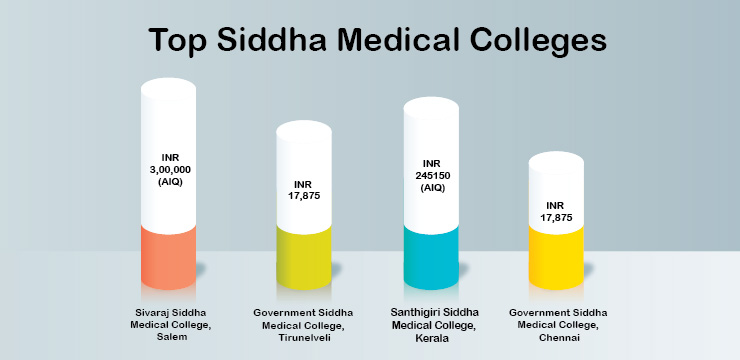
State-wise Siddha Medical Colleges in India
The following are the state-wise Siddha medical colleges in India:
Career Prospects & Jobs for Siddha Doctors?
Many sectors offer rewarding, challenging and well-paying job opportunities for Siddha Specialists. The government has started a separate division for Siddha Medicine known as the Centre Council for Research in Siddha (CCRA), proving the importance of Siddha Medicine in India. The CCRA recruits many Siddha Specialists as research professionals every year.
Numerous institutes in India offer Siddha Medicine, and well-qualified Siddha professionals can apply for teaching positions in the Siddha department. Many sectors, such as the Ministry of Health of AYUSH, Central Research Council, Health Department, Clinics, Nursing Homes, Laboratories, Pharma Industries etc., offer multiple job opportunities for Siddha Doctors.
Career Options for BSMS Course
Following are a few reputable and well-liked employment paths that candidates with BSMS degrees can choose.
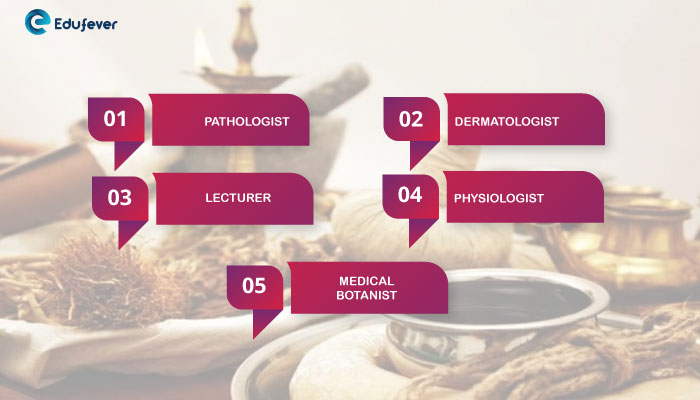
Employment Sectors for BSMS
The recruiters for everyone who has completed their BSMS are listed below.
- Establish a clinic of your own
- Siddha physician in a public hospital
- Clinical Research field
- Siddha Medicine Professor
Role of Siddha Doctor
As a Siddha practitioner, the following are the day to activities:
- Having appointments with patients and checking their pulse through the unique method specified in the Siddha treatment system.
- Devising a diagnosis of the illness based on examining skin, tongue, complexion, speech, eye, urine and stools.
- Prescribing Siddha medicines which use herbs, animal products and minerals as their sources.
- Counselling patients on diet requirements and hygiene.
Skills Required
Doctors diagnose and treat medical conditions, diseases and disorders through specialized medical knowledge and skills. Following are some of the skills required:
- Communication Skills
- Problem-solving skills
- Attention to detail
- Should be caring and sympathetic while treating the patients
- Time management and leadership skills
- Compassion and a good bedside manner
- Ability to work for long hours as well as under pressure
- Decision-Making skills
Average Salary
The initial stage of the Siddha Medical professional’s salary ranges from 2 lakh to 6.5 lakh per year. It can vary between the governmental and private sectors:
Government Jobs for BSMS:
| Job | Average Salary |
|---|---|
| Community Health Worker | 2.3 LPA |
| Research Assistant (Medical) | 3.5 LPA |
| Drug Safety Officer | 4.6 LPA |
| Medical Officer | 6.4 LPA |
Graphical Representation for Government Jobs for BSMS
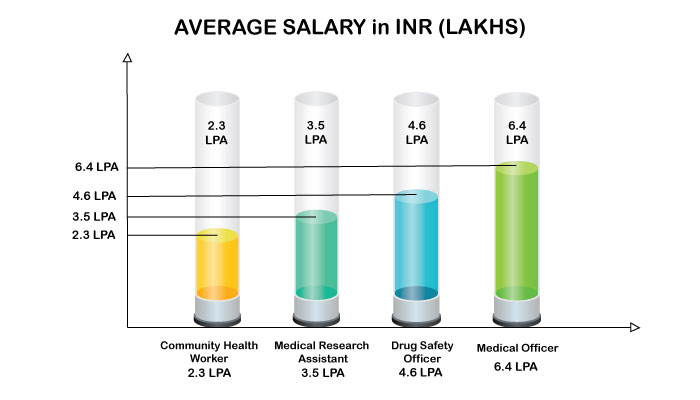
Private Jobs for BSMS
| Job | Average Salary |
|---|---|
| Medical Assistant | 3 LPA |
| Clinical Research Associate | 3.4 LPA |
| Medical Consultant | 7.2 LPA |
| Pathologist | 10 LPA |
Graphical Representation for Private Jobs for BSMS
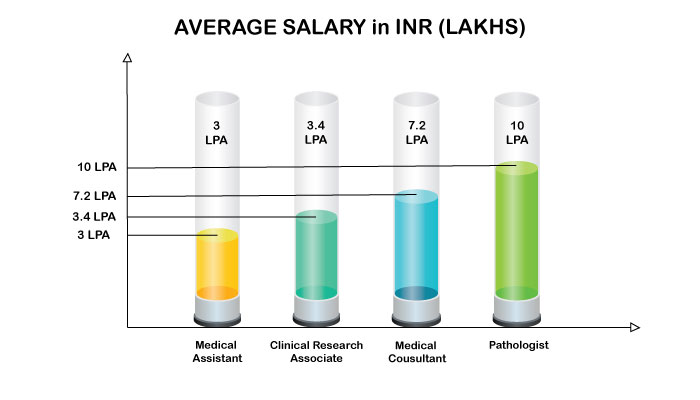
Frequently Asked Questions (FAQs)
Is Siddha a good career?
Siddha has witnessed many significant professionals that have earned names and respect for themselves. Siddha practitioners’ salaries vary from 2 LPA to 6.5 LPA based on private and government sectors.
What is the qualification for Siddha?
>Candidates must have passed 10+2 or equivalent examination with Physics, Chemistry, Biology/Biotechnology and English as the core subjects.
>Candidates must have passed Class 10th with Urdu or Arabic or Persian language as a subject or must have passed the test of Urdu of Class 10th.
Is there Siddha without NEET?
No, the National Eligibility cum Entrance Test (NEET) is required for admission in Siddha, Ayurveda and Homeopathy courses.
Which field is best for science students with Biology (PCB)?
Below mentioned Available Courses after 12th Science.
>MBBS
>BDS-dentistry.
>BAMS-Ayurveda.
>BHMS-Homeopathy.
>BUMS-Unani.
>BNYS–Naturopathy & Yogic Science.
>BSMS – Siddha Medicine & Sciences.
>Veterinary Science & Animal Husbandry (BVSc. AH)
What are some of the best career options for a Science student?
Check out our list of the top 7 highest paying science careers for inspiration to guide your science career journey.
>Geoscientists
>Atmospheric Scientists
>Biochemists and biophysicists
>Medical Scientists
>Hydrologist
Which is the best, BSMS or BAMS?
BSMS covers the concepts of only medicinal practices, whereas BAMS covers the concepts of surgery. Though both the courses focus on ancient medical systems, BAMS is more popular than BSMS among the candidates.
Is BSMS a doctor?
Upon completing their program, candidates can prefix “Dr” before their name and be called a doctor.
What is the full form of Ayush?
The full form of Ayush is Ayurveda, Yoga and Naturopathy, Unani, Siddha and Homeopathy.
What is the full form of BSMS?
The full form of BSMS is Bachelor of Siddha Medicine and Surgery.
How to become a Siddha doctor?
>The minimum eligibility for securing admission to any Siddha program is clearing 10+2 minimum 50% marks in Physics, Chemistry, Biology and English.
>Appear for the NEET entrance examination
>Opt for BSMS (Bachelor of Siddha Medicine and Surgery)
>After completing BSMS, candidates can opt for MD Siddha for further studies.
